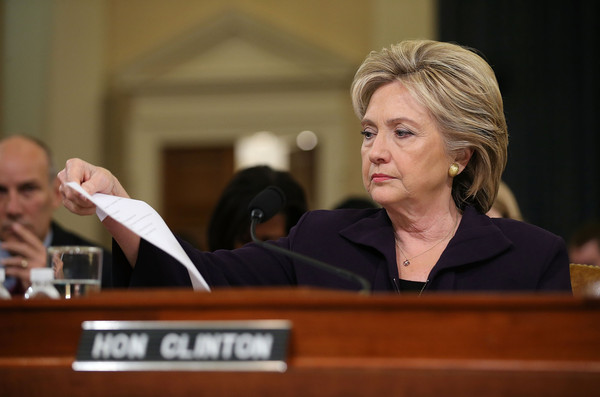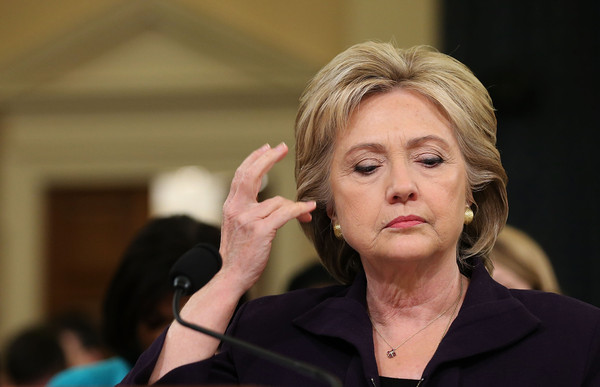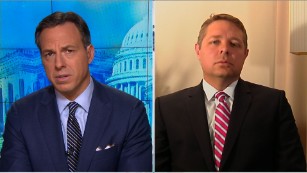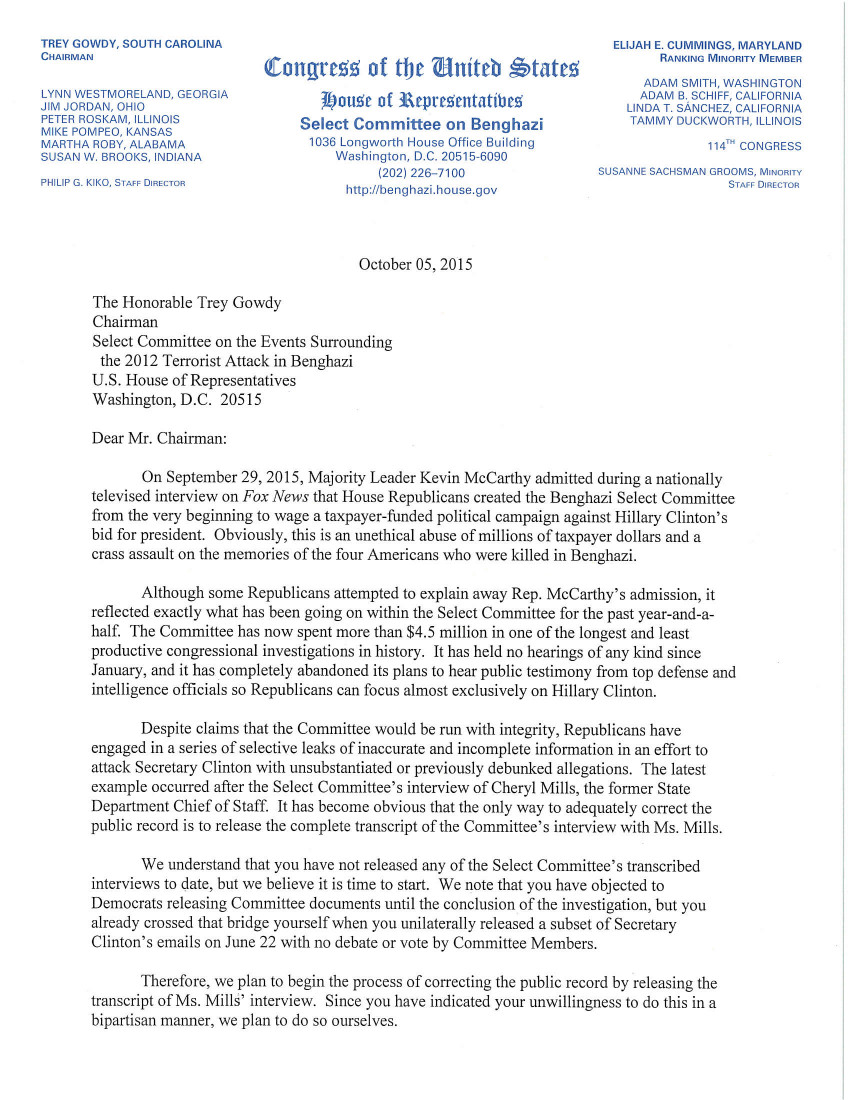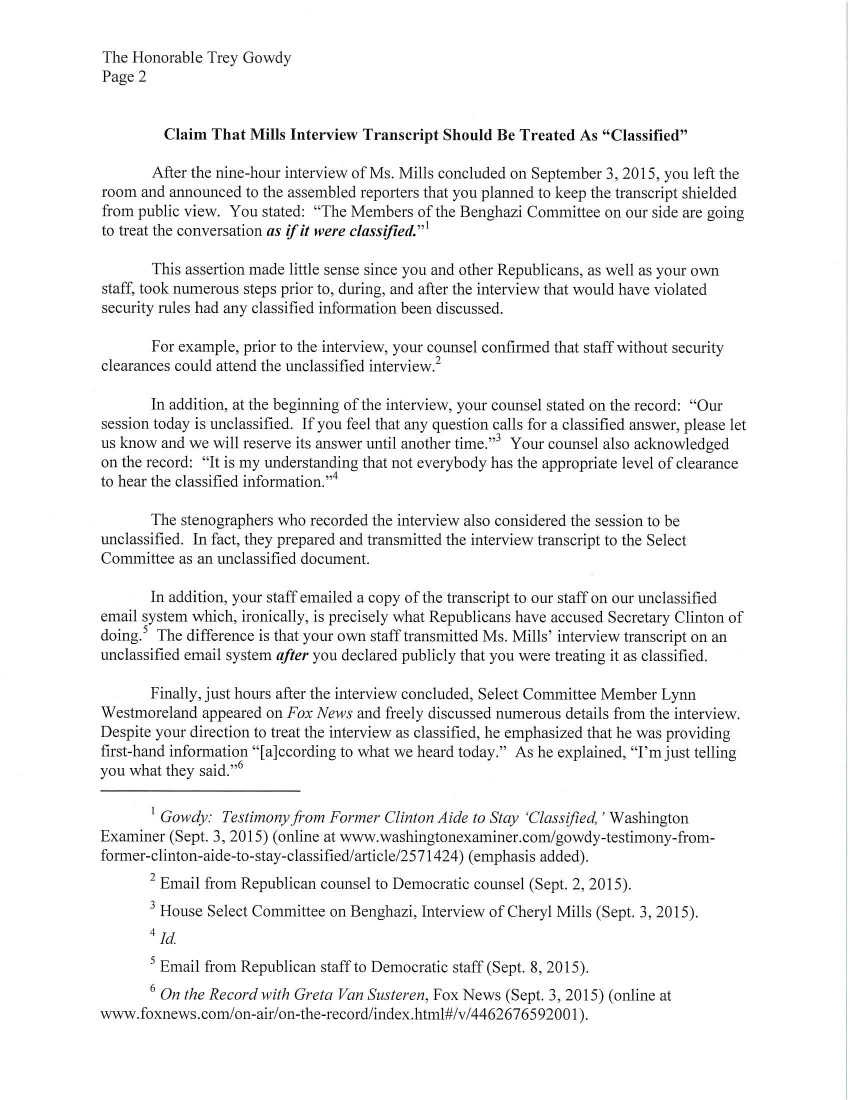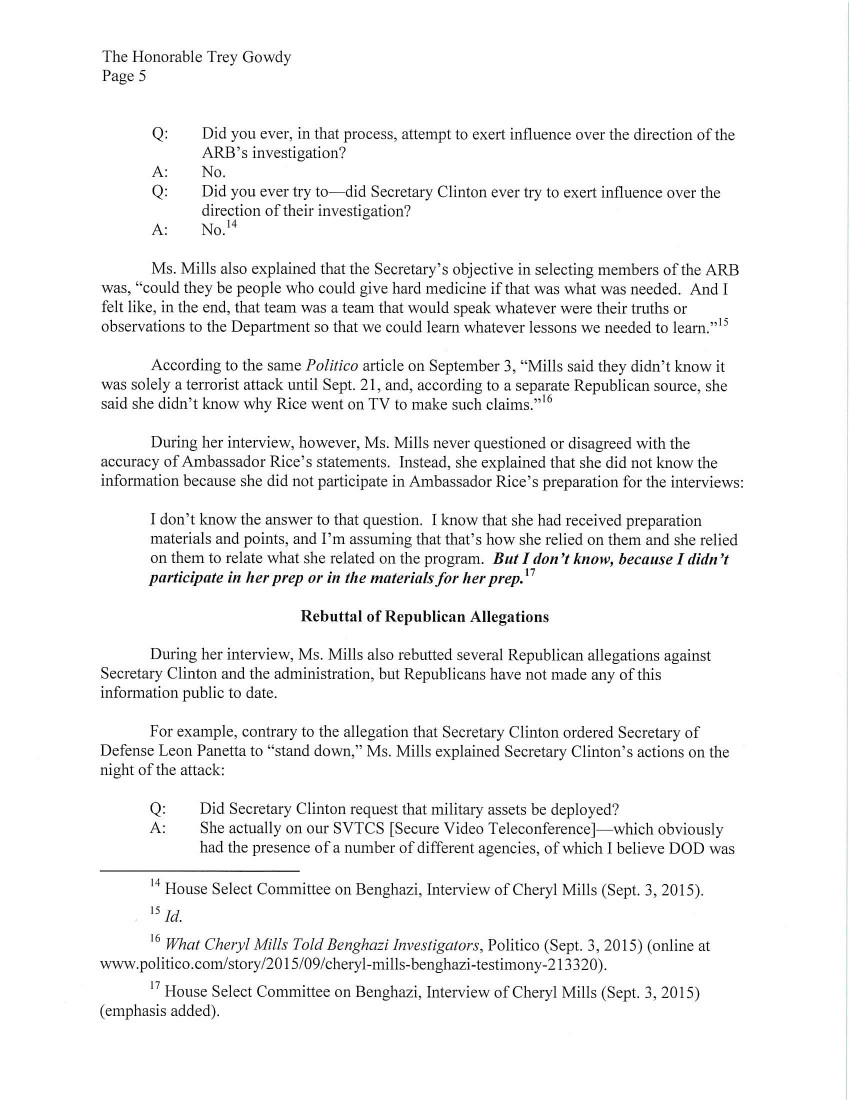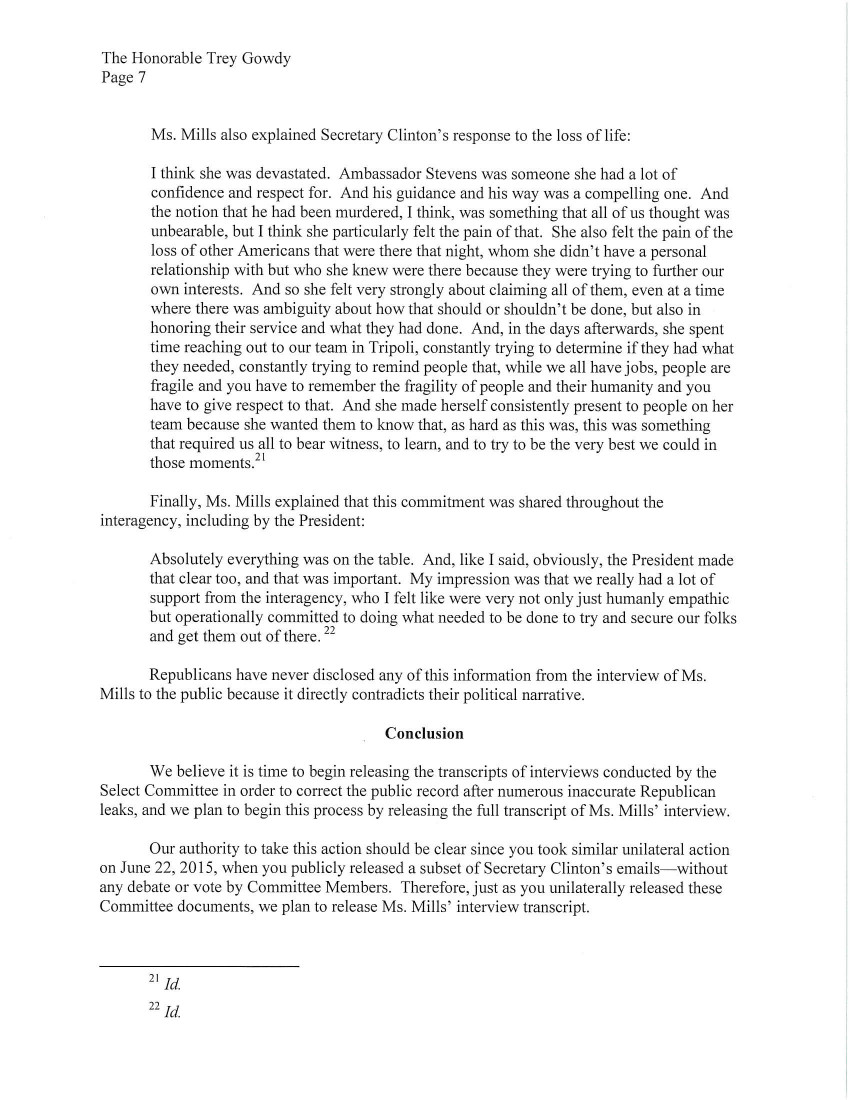WASHINGTON—Today, all five Democratic Members of the Select Committee on Benghazi sent a
letter
informing Chairman Trey Gowdy that they plan to begin releasing witness
interview transcripts, starting with the interview of former State
Department Chief of Staff Cheryl Mills, in order to correct the public
record after numerous inaccurate Republican leaks.
“Despite claims
that the Committee would be run with integrity, Republicans have
engaged in a series of selective leaks of inaccurate and incomplete
information in an effort to attack Secretary Clinton with
unsubstantiated or previously debunked allegations,” the Democrats
wrote.
“The latest example occurred after the Select Committee’s
interview of Cheryl Mills, the former State Department Chief of Staff.
It has become obvious that the only way to adequately correct the public
record is to release the complete transcript of the Committee’s
interview with Ms. Mills,” the Democrats wrote.
Democrats point to the Republican leaks as further evidence of Majority Leader Kevin McCarthy’s
stark admission
that House Republicans created the Benghazi Committee to wage a
taxpayer-funded political attack against Secretary Clinton’s bid for
president.
The Democrats’ letter released several excerpts from
Ms. Mills’ interview that rebut Republican allegations against Secretary
Clinton and the administration, but were never made public by
Republicans.
Before releasing the full transcript, Democrats are
giving Gowdy five days to identify any specific information in the
transcript he believes should “be withheld from the American people.”
“We
understand that you have not released any of the Select Committee’s
transcribed interviews to date, but we believe it is time to start. We
note that you have objected to Democrats releasing Committee documents
until the conclusion of the investigation, but you already crossed that
bridge yourself when you unilaterally released a subset of Secretary
Clinton’s emails on June 22 with no debate or vote by Committee
Members,” the Democrats wrote.
“Therefore, we plan to begin the
process of correcting the public record by releasing the transcript of
Ms. Mills’ interview. Since you have indicated your unwillingness to do
this in a bipartisan manner, we plan to do so ourselves.”
Read the full letter set forth below or online
here:
October 05, 2015
The Honorable Trey Gowdy
Chairman
Select Committee on the Events Surrounding
the 2012 Terrorist Attack in Benghazi
U.S. House of Representatives
Washington, D.C. 20515
Dear Mr. Chairman:
On
September 29, 2015, Majority Leader Kevin McCarthy admitted during a
nationally televised interview on Fox News that House Republicans
created the Benghazi Select Committee from the very beginning to wage a
taxpayer-funded political campaign against Hillary Clinton’s bid for
president. Obviously, this is an unethical abuse of millions of
taxpayer dollars and a crass assault on the memories of the four
Americans who were killed in Benghazi.
Although some
Republicans attempted to explain away Rep. McCarthy’s admission, it
reflected exactly what has been going on within the Select Committee for
the past year-and-a-half. The Committee has now spent more than $4.5
million in one of the longest and least productive congressional
investigations in history. It has held no hearings of any kind since
January, and it has completely abandoned its plans to hear public
testimony from top defense and intelligence officials so Republicans can
focus almost exclusively on Hillary Clinton.
Despite
claims that the Committee would be run with integrity, Republicans have
engaged in a series of selective leaks of inaccurate and incomplete
information in an effort to attack Secretary Clinton with
unsubstantiated or previously debunked allegations. The latest example
occurred after the Select Committee’s interview of Cheryl Mills, the
former State Department Chief of Staff. It has become obvious that the
only way to adequately correct the public record is to release the
complete transcript of the Committee’s interview with Ms. Mills.
We
understand that you have not released any of the Select Committee’s
transcribed interviews to date, but we believe it is time to start. We
note that you have objected to Democrats releasing Committee documents
until the conclusion of the investigation, but you already crossed that
bridge yourself when you unilaterally released a subset of Secretary
Clinton’s emails on June 22 with no debate or vote by Committee Members.
Therefore,
we plan to begin the process of correcting the public record by
releasing the transcript of Ms. Mills’ interview. Since you have
indicated your unwillingness to do this in a bipartisan manner, we plan
to do so ourselves.
Claim That Mills Interview Transcript Should Be Treated As “Classified”
After
the nine-hour interview of Ms. Mills concluded on September 3, 2015,
you left the room and announced to the assembled reporters that you
planned to keep the transcript shielded from public view. You stated:
“The Members of the Benghazi Committee on our side are going to treat
the conversation as if it were classified.”
This
assertion made little sense since you and other Republicans, as well as
your own staff, took numerous steps prior to, during, and after the
interview that would have violated security rules had any classified
information been discussed.
For example, prior to the
interview, your counsel confirmed that staff without security clearances
could attend the unclassified interview.
In addition,
at the beginning of the interview, your counsel stated on the record:
“Our session today is unclassified. If you feel that any question calls
for a classified answer, please let us know and we will reserve its
answer until another time.” Your counsel also acknowledged on the
record: “It is my understanding that not everybody has the appropriate
level of clearance to hear the classified information.”
The
stenographers who recorded the interview also considered the session to
be unclassified. In fact, they prepared and transmitted the interview
transcript to the Select Committee as an unclassified document.
In
addition, your staff emailed a copy of the transcript to our staff on
our unclassified email system which, ironically, is precisely what
Republicans have accused Secretary Clinton of doing. The difference is
that your own staff transmitted Ms. Mills’ interview transcript on an
unclassified email system after you declared publicly that you were
treating it as classified.
Finally, just hours after
the interview concluded, Select Committee Member Lynn Westmoreland
appeared on Fox News and freely discussed numerous details from the
interview. Despite your direction to treat the interview as classified,
he emphasized that he was providing first-hand information “[a]ccording
to what we heard today.” As he explained, “I’m just telling you what
they said.”
During Ms. Mills’ interview, she conducted
herself professionally, she answered every question posed to her, and
she debunked numerous Republican conspiracy theories that have been made
for several years—and that continue to be repeated even today—yet
Republicans did not make any of that information public.
Republicans
may have their own partisan political reasons for wanting to keep Ms.
Mills’ interview transcript out of the public view, but they may not
suddenly claim it is now classified merely to prohibit its release to
the American people. According to Executive Order 13526, information
may not be classified merely to “prevent embarrassment to a person,
organization, or agency”—including embarrassment to the Select
Committee.
Inaccurate Republican Leaks
Republicans
began leaking inaccurate information about Ms. Mills’ interview within
minutes after your public declaration that it should be treated as
classified.
Prior to her interview, Ms. Mills’ counsel
wrote to request that the interview be held in public in light of the
“numerous reports in the press, as well as public comments from members
of your Committee regarding Ms. Mills’ upcoming interview.” At the
beginning of the interview, Ms. Mills’ counsel renewed her request to
make the transcript public, stating, “I would only ask today that at the
end of the day, because this is an unclassified hearing, as was just
explained to us, that the transcript be released publicly.”
Instead,
Republicans began leaking inaccurate information about the interview
out of context. For example, Politico published an article on the front
page of its website entitled, “What Cheryl Mills Told Benghazi
Investigators.” Relying on multiple “GOP” and “Republican” sources,
Politico wrote that “one of the biggest surprises” from the interview
was that Ms. Mills “had reviewed and made suggestions for changes” to
the report of the Accountability Review Board (ARB). According to “a
separate, GOP source,” this supposedly new revelation was “raising
alarms on the right” and “call[s] into question the ‘independence’” of
the report’s conclusions. Select Committee Member Jim Jordan later
provided an interview to another media outlet raising these same
concerns.
In fact, this claim was already known—and had
been debunked—two years earlier during the investigation led by former
Oversight Committee Chairman Darrell Issa.
On June 4,
2013, Ambassador Thomas Pickering, the Chairman of the ARB who served
with distinction under both Republican and Democratic Administrations,
testified before the Oversight Committee in a sworn deposition. In the
transcript made public two years ago, he explained that the ARB provided
a draft of the report to the Secretary’s office to ensure “the accuracy
and the focus of our recommendations” before they were released. He
also testified then that while the ARB considered some of Ms. Mills’
thoughts about the report, neither Secretary Clinton nor Ms. Mills tried
to influence the outcome of the ARB’s findings in any way and had no
editing rights.
A review of the ARB by the State Department Inspector General issued in September 2013 concluded:
ARB
members were conscious of the need to protect their impartiality by
limiting their contact with senior managers of the Department during the
process. Former members unanimously told OIG team that they
encountered no attempts to impede, influence, or interfere with their
work at any time or on any level.
Instead of being part
of a process to interfere with the findings of the ARB, Ms. Mills
participated in the same kind of routine process used by the Government
Accountability Office, Inspectors General, and other independent
investigative entities that provides agencies under review an
opportunity to provide comments before reports are publicly released so
investigators can make changes they deem appropriate to ensure their
accuracy.
During her interview, Ms. Mills corroborated both Ambassador Pickering’s testimony and the Inspector General’s findings:
Q: Did you ever, in that process, attempt to exert influence over the direction of the ARB’s investigation?
A: No.
Q: Did you ever try to—did Secretary Clinton ever try to exert influence over the direction of their investigation?
A: No.
Ms.
Mills also explained that the Secretary’s objective in selecting
members of the ARB was, “could they be people who could give hard
medicine if that was what was needed. And I felt like, in the end, that
team was a team that would speak whatever were their truths or
observations to the Department so that we could learn whatever lessons
we needed to learn.”
According to the same Politico
article on September 3, “Mills said they didn’t know it was solely a
terrorist attack until Sept. 21, and, according to a separate Republican
source, she said she didn’t know why Rice went on TV to make such
claims.”
During her interview, however, Ms. Mills never
questioned or disagreed with the accuracy of Ambassador Rice’s
statements. Instead, she explained that she did not know the
information because she did not participate in Ambassador Rice’s
preparation for the interviews:
I don’t know the answer
to that question. I know that she had received preparation materials
and points, and I’m assuming that that’s how she relied on them and she
relied on them to relate what she related on the program. But I don’t
know, because I didn’t participate in her prep or in the materials for
her prep.
Rebuttal of Republican Allegations
During
her interview, Ms. Mills also rebutted several Republican allegations
against Secretary Clinton and the administration, but Republicans have
not made any of this information public to date.
For
example, contrary to the allegation that Secretary Clinton ordered
Secretary of Defense Leon Panetta to “stand down,” Ms. Mills explained
Secretary Clinton’s actions on the night of the attack:
Q: Did Secretary Clinton request that military assets be deployed?
A:
She actually on our SVTCS [Secure Video Teleconference]—which
obviously had the presence of a number of different agencies, of which I
believe DOD was one—said we need to be taking whatever steps we can, to
do whatever we can to secure our people. And I can remember that
someone from the White House said that the President was 100 percent
behind whatever needed to be done and we needed to do whatever needed to
be done. And that’s, you know, that’s what he would expect, but it’s
also what was said.
Ms. Mills also explained how Secretary Clinton pressed for rapid action in response to the attacks:
She
was pretty emphatic about wanting whatever to be done and whatever were
assets that could be deployed, if that was both effective and possible
to be done. Obviously, it was a challenging environment, given that our
compound had been overrun. And so you want to ensure that, as you also
are thinking about who else might go in, how they are able to do that
effectively. But my observation and impression and, obviously,
engagements were around what can be done, what can be sent, and how can
that be done best. There was not any notion of not doing that to the
fullest amount that was practical, effective, and possible.
Ms. Mills also had the following exchange about Secretary Clinton’s level of engagement on the night of the attacks:
A:
She was very concerned. She was also very determined that
whatever needed to be done was done. And she was worried. She was
worried not only about our team on the ground in Benghazi but worried
about our teams that were on the ground in Libya and our teams on the
ground in a number of places, given what we had seen unfold in Egypt.
Q: Did she seem uncertain as to how to respond?
A:
No. She was very—she was very certain. And, indeed, when we
said it was going to be a staff SVTCS, which was our diplomatic way of
saying that maybe she shouldn’t be attending, she said, “I’m coming.”
And so we tried to make sure the rest of the interagency knew ahead of
time that she was going to be on, but we were unsuccessful, so they were
surprised when she sat down.
Q: So were you surprised by that?
A:
I’m not surprised, because that’s her approach. She’s a
person who steps in and leads. She’s someone who, when there is
accountability, takes it. So I wasn’t surprised. But I know that it
can sometimes be intimidating to other staff that there is a principal
present. And what she really was communicating that night is, “I’m here
because I want my team safe. I’m not here because I’m here for any
other reason than trying to get their safety. And whatever we need to
do to do that I want to do.”
Ms. Mills also explained Secretary Clinton’s response to the loss of life:
I
think she was devastated. Ambassador Stevens was someone she had a lot
of confidence and respect for. And his guidance and his way was a
compelling one. And the notion that he had been murdered, I think, was
something that all of us thought was unbearable, but I think she
particularly felt the pain of that. She also felt the pain of the loss
of other Americans that were there that night, whom she didn’t have a
personal relationship with but who she knew were there because they were
trying to further our own interests. And so she felt very strongly
about claiming all of them, even at a time where there was ambiguity
about how that should or shouldn’t be done, but also in honoring their
service and what they had done. And, in the days afterwards, she spent
time reaching out to our team in Tripoli, constantly trying to determine
if they had what they needed, constantly trying to remind people that,
while we all have jobs, people are fragile and you have to remember the
fragility of people and their humanity and you have to give respect to
that. And she made herself consistently present to people on her team
because she wanted them to know that, as hard as this was, this was
something that required us all to bear witness, to learn, and to try to
be the very best we could in those moments.
Finally, Ms. Mills explained that this commitment was shared throughout the interagency, including by the President:
Absolutely
everything was on the table. And, like I said, obviously, the
President made that clear too, and that was important. My impression
was that we really had a lot of support from the interagency, who I felt
like were very not only just humanly empathic but operationally
committed to doing what needed to be done to try and secure our folks
and get them out of there.
Republicans have never
disclosed any of this information from the interview of Ms. Mills to the
public because it directly contradicts their political narrative.
Conclusion
We
believe it is time to begin releasing the transcripts of interviews
conducted by the Select Committee in order to correct the public record
after numerous inaccurate Republican leaks, and we plan to begin this
process by releasing the full transcript of Ms. Mills’ interview.
Our
authority to take this action should be clear since you took similar
unilateral action on June 22, 2015, when you publicly released a subset
of Secretary Clinton’s emails—without any debate or vote by Committee
Members. Therefore, just as you unilaterally released these Committee
documents, we plan to release Ms. Mills’ interview transcript.
We
do not take this action lightly. We have held off on taking such
action for more than a year, but we will no longer sit and watch
selective, out-of-context leaks continue to mischaracterize the
testimony the Select Committee has received.
Please
notify us within five days if you believe any information in the full
transcript should be withheld from the American people. We are
providing the State Department and Ms. Mills’ attorneys with this same
opportunity.
Sincerely,
Rep. Elijah E. Cumming Rep. Adam Smith Rep. Adam B. Schiff
Rep. Linda T. Sánchez Rep. Tammy Duckworth












